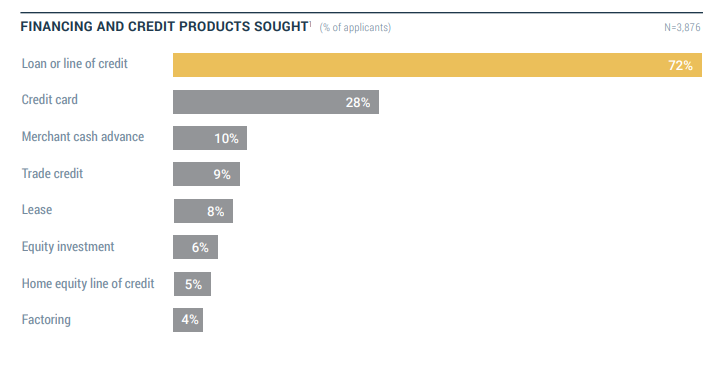DoorDash Capital Warrants No Mention in Latest Report
May 23, 2022Readers interested in hearing the results of DoorDash’s foray in to MCA funding were keenly disappointed by the last earnings call. It didn’t even come up. The product was formally announced by DoorDash on February 9th. At the time, the company said that it was offering DoorDash merchants MCAs through a partner company named Parafin. The offers would be visible right in the DoorDash portal.
DoorDash reported Q1 revenue of $1.5B and a net loss of $167M. The material impact of DoorDash Capital, only in its infancy, was likely minimal then.
Register for The 4th Annual Alternative Finance Bar Association Conference
May 12, 2022 The fourth annual Alternative Finance Bar Association conference is BACK IN PERSON. This is the go-to event for and with the industry’s leading attorneys.
The fourth annual Alternative Finance Bar Association conference is BACK IN PERSON. This is the go-to event for and with the industry’s leading attorneys.
Mark your calendars for June 15th and June 16th in New York City and register by emailing Lindsey Rohan at lindsey@lrohanlaw.com. Registration is subject to approval and space availability.
Two-day program includes the following panels:
The State of the Industry: Industry experts discuss pending legislation, case law and market hurdles. They have both a regulatory panel ready to discuss what’s new in Virginia, Utah, NY and California as well as a Courtroom panel ready to discuss the winning and losing case law that has come out in the past year.
Bankruptcy: The aftermath of Chicago v. Fulton, In re Shoot the Moon and other pivotal bankruptcy cases that shape industry practices.
Ethics: Challenges faced by internal counsel and ways to navigate those pressures.
Collections: Trends in the post-COJ, post-COVID era.
Employment/Labor Law: The rise of labor use outside the U.S. What challenges arise from having call centers outside the U.S. Tax implications, oversight and practical benefits/detriments. Post-COVID remote work implications. What you need to be aware of to avoid creating liabilities.
The Art of Arbitration: The importance of a carefully drafted Arbitration Clause and the pro/cons of this venue.
Thinking Ahead: What technologies and market conditions will shape the future of the industry. Broad discussion of Blockchain technology, CRM systems, cannabis and what we can imagine will shape the future of Alternative finance.
WEDNESDAY KEYNOTE: David Picon, Esq. – It is with great pride that David Picon of Proskauer Rose will be the Keynote speaker. For years the AFBA has admired his work from afar. Attendees now have an opportunity to learn directly from David what makes for an unstoppable litigator.
THURSDAY SPECIAL EVENT: AFBA Game Show Mash-Up with the Industry’s Legendary Attorneys. Special Guests you will not want to miss!
Speakers:
- Andrew Smith, Covington & Burlington LLP
- Brian Simon, Hollis Public Affairs
- Jamie Polon, Mavrides Moyal Packman & Sadkin, LLP
- Patrick Siegfried, Rapid Finance
- Natalie Pappas, Rapid Finance
- Keith Ellis, Expansion Capital Group
- Kate Fisher, Hudson Cook LLP
- Cathy Brennan, Hudson Cook LLP
- Blake Sims, Hudson Cook LLP
- Steve Denis, Small Business Finance Association
- Christopher R. Murray, Murray Legal PLLC
- Mark Stout, Padfield & Stout
- Shanna Kaminski, Kaminski Law Group
- Michael W. Davis, DTO Law
- John Viskocil, Fora Financial
- Gabriel Mendelberg, Mendelberg P.C.
- Anthony F. Giuliano, Giuliano Law P.C.
- Jeffrey S. Cianciulli, Weir Greenblatt Pierce LLP
- David Picon, Proskauer Rose
- Jonathan Nelson, Dedicated Financial GBC
- Lindsey Rohan, BasePoint Capital LLC
- Christina Grigorian, Katten; Zach Miller, Burr & Foreman
- Renata Buhkman, Delta Bridge Funding
- Vanessa Petty, Settle
- Alexis Shapiro, Forward Financing
- Jan Owens, Manatt Phelps
- Scott Pearson, Manatt Phelps
- Jesse Michael Carlson, Kapitus
- Robert Zadek, Buchalter
When:
Day 1 – June 15
9:00am – 4:30pm: Offices of Proskauer Rose (includes light breakfast and lunch)
5:30pm – 7:30pm: Cocktails at Dear Irving
Day 2 – June 16
9:30am – 6:00pm: 15 W. 38th Street, 2nd Fl, Sinatra Room (includes light breakfast and lunch)
4:00pm: Wine & Cheese
Register soon, SPACE IS LIMITED!
deBanked is a sponsor of the event. Industry attorneys are highly encouraged to attend.
Shopify Capital Originated $346.7M in Business Funding in Q1
May 8, 2022 Shopify Capital originated $346.7M in MCAs and business loans in Q1, the company announced. That included merchants in the US, UK, and Canada. Though it was a 12% increase over the same period last year, the figure puts them virtually on par with originations in 2021 if the following three quarters hold steady.
Shopify Capital originated $346.7M in MCAs and business loans in Q1, the company announced. That included merchants in the US, UK, and Canada. Though it was a 12% increase over the same period last year, the figure puts them virtually on par with originations in 2021 if the following three quarters hold steady.
Shopify was one of the only online lenders whose origination volume substantially increased during covid. Most experienced significant drops but have since dramatically recovered.
“The hundreds of thousands of businesses that shifted their business to Shopify during the pandemic and stayed with us since can now take advantage of our powerful retail point-of-sale offering for a unified view of their sales online and offline,” said Shopify CEO Harley Finkelstein during the Q1 earnings call. “Shopify has been developing the world’s best point-of-sale retail software for years, and it’s now at the point where all merchants who came to Shopify during the pandemic can leverage it.”
Large Fintech Companies Helping to Normalize Revenue Based Financing
May 6, 2022 With business increasing for wide-reaching financial technology companies like Square, Paypal, and Shopify, this has brought more attention to revenue-based financing products like the ones they offer. Henry Abenaim, Founder and CEO of Fundingo, said that it brings more businesses to the table.
With business increasing for wide-reaching financial technology companies like Square, Paypal, and Shopify, this has brought more attention to revenue-based financing products like the ones they offer. Henry Abenaim, Founder and CEO of Fundingo, said that it brings more businesses to the table.
“…you sometimes think it’s a small world or small group of merchants, and you really come to realize that it’s huge,” he told deBanked. “And the more they’re serviced, the more they need, the more they grow. So it just feels like there’s just more awareness of the product, and then more merchants that are going to come in demand and ask for it, as well as these bigger players are always going to service only a subset of the businesses.”
At the same time, a greater public awareness of options could tighten margins for certain funding providers. “I think it’s going to make the merchants that are way more bankable… get lower price deals, so it’s going to hurt the margins, it’s going to hurt the profits,” Abenaim commented.
John Bulnes, Vice President of Business Development at Fenix Capital Funding, expressed how it is not yet determined what kind of effect the larger mainstream companies will have on the industry. “I do think it’s something that the larger first position MCA companies may feel the effects of first, because they’re going to be competing more or so with taking away clients from those companies first, as opposed to the companies that are smaller that are doing shorter term deals.”
As these big companies operate with larger capital bases, it may indeed become more difficult for smaller companies to compete.
“… it’s going to be something that’s going to constantly adapt and fluctuate as time goes, but I do see it as an expanding industry… it’s kind of a sign that when you see more commercials and we see these bigger companies jumping into the space, that it is something that’s going to continue to grow,” said Bulnes.
And commercials and ads are definitely increasing. One of the largest online small business lenders in the country was asked about their TV and radio campaigns during their recent quarterly earnings call.
“We’ve definitely been ramping [commercials up] hopefully with a little bit more diligence than OnDeck was running ads three or four years ago,” said David Fisher, CEO of Enova. “But we’ve definitely jump back into kind of broader base advertising in that business and it’s been working really well.”
New Domain Name Gold Rush Sets Up Possible Battle for Future of SMB Finance
April 25, 2022 If you could have businessloan.com or businessloans.com as your website, would you jump on the opportunity to get it?
If you could have businessloan.com or businessloans.com as your website, would you jump on the opportunity to get it?
It’s evident that the market for keyword-based domains has evolved over time. Couldn’t get the .com? You could’ve tried to get the less coveted .net or .org. Don’t like those? Today, you can get the .business, .deals, .financial, .loan, .loans, or hundreds of other customized tlds. With so many to choose from, most experts in the field would advise that if you don’t own the .com version, to not even bother getting cute with customizations for your brand or keyword because customers will just get confused.
But recently, another domain name market has quietly been gaining steam. It’s for something called a .eth, an Ethereum blockchain-based crypto address shortener by the Ethereum Name Service. It’s not necessarily something one could use to build a website with, at least not yet. Originally envisioned as a way to condense long impossible-to-remember crypto wallet addresses into memorable words, users have started to buy up a bunch of keywords that may be familiar to deBanked readers. Just to name a few:
- businessloan.eth
- businessloans.eth
- smbloans.eth
- merchantcashadvance.eth
- ach.eth
- syndication.eth
- lending.eth
- ppploan.eth
- underwriting.eth
- brokers.eth
- loanbroker.eth
- mca.eth
- factoring.eth
- funding.eth
- backdoored.eth
At face-value, this might appear to be a vanity crypto play, one in which one could send crypto to your-name-here.eth instead of trying to type out a long address like: 0x64233eAa064ef0d54ff1A963933D0D2d46ab5829. But an ENS domain name holds much more potential than just that. It’s moving towards becoming the backbone of one’s identity in the upcoming era of the web called web 3.0 (web3 for short). Instead of having to remember passwords for hundreds of websites, identity can be validated through one’s digital wallet. Such a concept is not theoretical. It’s already being used.
 Take seanmurray.eth for example. You could send eth, bitcoin, litecoin, or dogecoin to it, but at the same time it’s connected to an email address and a url (this one). Plus it’s linked to an NFT avatar (broker #7 from The Broker NFT collection) which is in that wallet. I can use it to do an e-commerce online checkout in 5 seconds without ever needing to enter any payment information even if I’ve never visited the site before. It’s faster than PayPal and with less steps involved. I can connect it to my twitter account, OpenSea, or use it to vote in an official poll without ever having to create an account on something. The wallet is the identity verification. The .eth name, therefore, has the potential to become the defining baseline of who or what one is on the internet. Not theoretically. It’s already happening.
Take seanmurray.eth for example. You could send eth, bitcoin, litecoin, or dogecoin to it, but at the same time it’s connected to an email address and a url (this one). Plus it’s linked to an NFT avatar (broker #7 from The Broker NFT collection) which is in that wallet. I can use it to do an e-commerce online checkout in 5 seconds without ever needing to enter any payment information even if I’ve never visited the site before. It’s faster than PayPal and with less steps involved. I can connect it to my twitter account, OpenSea, or use it to vote in an official poll without ever having to create an account on something. The wallet is the identity verification. The .eth name, therefore, has the potential to become the defining baseline of who or what one is on the internet. Not theoretically. It’s already happening.
Crypto is already starting to creep into the small business finance industry. In August, a funding company announced that it would begin offering commissions and fundings in crypto because of the speed potential. Far from being a gimmick, brokers started to choose crypto payments over ACH or a wire because of how fast it would be. There’s also no chargeback risk with crypto.
Currently, the owner of mca.eth has listed the domain for sale on OpenSea at a price of 20 eth (approximately $60,000). That’s less than what MerchantCashInAdvance.com sold for in 2011. Perhaps the value of an Ethereum Name Service domain holds less promise than a website that ranked well on Google in 2011. But then again, being well ranked on Google is not as important as it used to be. It’s impossible to say what, if any impact web3 will have on the small business finance industry long term, but for now there are those out there quietly buying up names like ach and funding and syndication on the chance that they will become something.
Man Who Defrauded MCA Companies Indicted
April 19, 2022 An alleged fraud executed five years ago against merchant cash advance companies did not go unnoticed. A grand jury indicted an El Dorado Hills resident named Suneet Singal on April 7th under seal. The Department of Justice announced it yesterday morning.
An alleged fraud executed five years ago against merchant cash advance companies did not go unnoticed. A grand jury indicted an El Dorado Hills resident named Suneet Singal on April 7th under seal. The Department of Justice announced it yesterday morning.
According to the Grand Jury, Singal engaged in a scheme to fraudulently induce financing companies to provide merchant cash advances to a company he had previously sold and no longer owned. In doing so, Singal allegedly received six wires from four financing companies between April 12 and May 22, 2017 in the amounts of $197,370, $112,308, $48,500, $294,946, $96,970, and $43,975. The indictment did not cite any of the companies by name. Allegedly, Singal used those funds for various expenses, and the company he did not own was forced to file for bankruptcy. Singal was indicted on 10 counts.
The DOJ did not publish the full indictment but it can viewed in its entirety here. Despite the “sealed” stamp at the top, the court ordered it be unsealed upon Singal’s arrest and is public record.
Ten Percent of Small Businesses That Sought Financing in 2021 Sought a Merchant Cash Advance
April 18, 2022A whopping 10% of small businesses that sought financing last year sought out a merchant cash advance, according to the latest study published by the Federal Reserve. That figure was up from 8% in 2020 and 9% in 2019. For the the preceding years, that figure had held fairly consistent at 7%. [See 2015, See 2017]. Market penetration, therefore, has arguably increased by about 40% since 2015.

Meanwhile, the percentage of applicants that sought out leasing has gone down over the last seven years: from 11% in 2015 to 8% in 2021. Factoring has hovered around 3-4% consistently.
The pursuit of of loans and lines of credit decreased dramatically from 89% in 2020 to 72% in 2021. And approvals have gone down across the board. Approvals on business loans, lines of credits, and MCAs hit a peak of 83% in 2019 and plunged to 76% in 2020, the first year of Covid. The figure fell even further in 2021, down to 68%. Online lenders and large banks had the lowest approval rates overall, at 51% and 48% respectively.
Small Business Finance Industry Mulls What’s in The Rearview, Is Optimistic For Rest of 2022
April 14, 2022 The small business finance industry is looking ahead to anticipated growth for the remainder of the year, despite new challenges ahead. With massive government aid fading in the rearview, some industry players now have had the time to consider what the impact of it was as they move onward into the future.
The small business finance industry is looking ahead to anticipated growth for the remainder of the year, despite new challenges ahead. With massive government aid fading in the rearview, some industry players now have had the time to consider what the impact of it was as they move onward into the future.
Bob Squiers of Meridian Leads expressed his view on the topic, “a lot of our customers, mostly the ISO shops, many of them converted and started selling and pitching the government programs. So in that sense it kind of helped keep those guys afloat, helped keep our business going. A lot of what we do in the marketing side, translated for those government programs. But then it did also squash the demand for the cash advance.”
In some cases, government funding has helped merchants pay off pre-existing obligations in a timely manner. Matthew Washington, founder and CEO of Moneywell GRP, noted, “An educated business owner is using the financing options available as they see fit for the timing. Someone that is waiting to get an SBA or an EIDL is more susceptible to take a bridge product to get them through that time gap,” he said. “As long as you’re working with the merchant and pushing out good products and you know what is on the rise, I think it has done nothing but help in some cases.”
Trucking became one of the number one fields that made up a large percentage of submissions during the pandemic, industry insiders say. However, with gas prices increasing, business with trucking could go down. Other businesses such as restaurants, where only a third received funding last year from the government, are desperate for funding.
“There’s tons of restaurants left that haven’t yet received their funding. So we could be seeing a lot of exposure in that industry,” stated Michael Yunatan of Specialty Capital. “But overall, I definitely do feel that we’ll be seeing an uptrend in our numbers across the board.”
“We definitely do think the industry is growing as a whole,” said Yunatan. “Even though we are a new player in the space we have been growing.”
Chad Otar, founder and CEO of Lending Valley, said, “We need to keep monitoring the interest rates that are coming up from the Federal Reserve, we need to make sure we’re not heading towards a recession, we need to make sure that we’re able to fully have the capital ready, in order to be able to deploy at a reasonable rate.”
Otar acclaimed the indirect benefit of large tech companies operating in the space with a competing product, arguing that the presence of PayPal and Amazon are helping to bring exposure to the industry overall.
“And now that Kabbage is back as well, since they partnered up with American Express, it’s gonna help us out to be able to push the product more into the mainstream,” said Otar. “So I believe there will be a growth in the industry.”






























